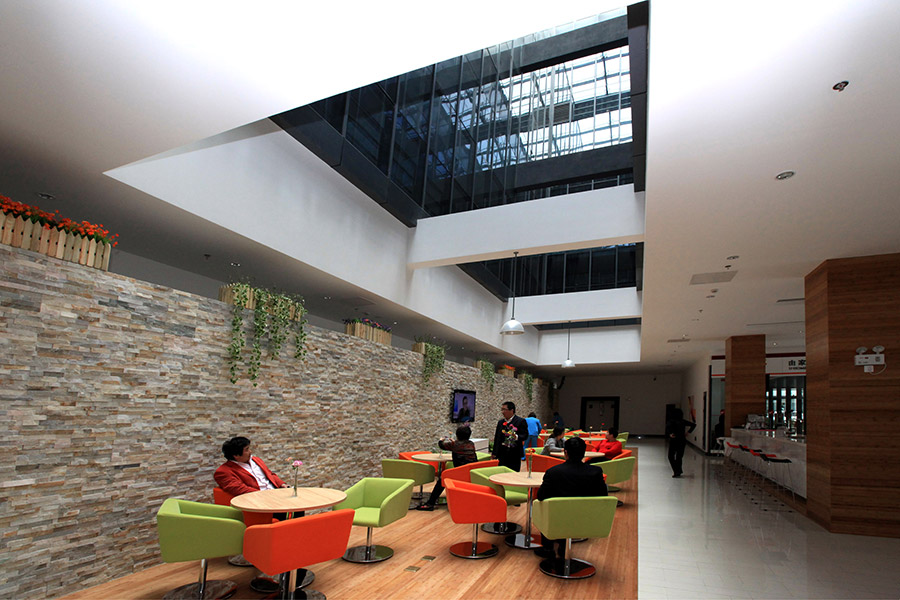Tenant and very happy
 |
|
Professionals enjoy community areas in their exclusive serviced apartments in Jinqiao, Shanghai. [Xu Wanglin/for China Daily] |
New policies humanize China's home market that was tending to go askew
Huzhou-based Li Heqin was both elated and anxious when he was told in mid-August that his job promotion would relocate him to Shanghai to work as an automobile parts supplier's regional manager for East China.
Excited because promotion would mean stiffer challenges and bigger rewards; and anxious because the move from Zhejiang province would require him to eject from his own two-bedroom apartment to a rented flat in the big city, a potential nightmare in the current tight property market scene.
Or so he thought, going by his prior experience as a tenant. Over the last 10 years, Li rented several homes in Huzhou until he managed to save a bit and bought a flat in February.
"I'm really fed up of renting. The property owner could call any time and say I should vacate because he wants to sell the property. I had to move out as many as six times in the past nine years for such reasons," he said.
Millions of tenants, especially migrants, scholars and other newcomers to cities, across urban China will probably have similar tales of woe to share.
In China, about 140 million urban residents are tenants. And 196 million migrants are living in rented rooms, according to data of the National Bureau of Statistics.
As it turned out, Li's fears and presumptions proved to be outdated.
He found a lovely two-bedroom serviced apartment in Jiading district of Shanghai. Rent: about 9,800 yuan ($1,462) per month-about one-third of his income.
He is quite satisfied and even surprised that he could find such a decent flat on a two-year lease. What's more, it came with an option to renew. He was even given the freedom to do up the place as per his tastes.
Li is beginning to see that his long-held beliefs about life as a tenant may need to be refreshed. "Renting a home can also ensure a decent life. If I could have such a place to live in wherever I work, I don't really need to buy any property," he said.
Li's fantasy-like vision could soon become reality in China as the supply of tenant-friendly homes is being sought to be increased in the next few years.
What would make that possible is a wave of measures to make available properties for both leasing and sale.
The policy is regarded as one of long-term mechanisms to ensure healthy and stable development of the market.
Since March, a series of measures across China, covering financing, land supplies, household registration policy, and policies for access to public resources, have been introduced to stoke growth of the home rental market.
In Shanghai, two land parcels were designated for the development of apartments for lease, and two commercial-use land parcels in a key area will be transformed into housing projects for tenants who work in a high-tech park. The housing projects will be complete with kindergartens and other facilities.
In Hangzhou, Zhejiang province, the local government has been piloting an online home rental platform that looks like a digital marketplace, enabling transparent contracts, mutual reviews of property owners and tenants.
In Wuxi, Jiangsu province, tenants who meet a set of criteria (like having lived and worked in the city for a certain number of years, and participation in the social security program), will be able to receive household registration now. They would also have equal access to public resources as property owners.
"Under the context of establishing a housing system that promotes both buying and renting, it's easier for migrants to settle in cities," said Louisa Zhu, business development director of Savills Residence.
"For developers, asset management and capital deployment can be potentially profitable."
For residents, adoption of new lifestyles opens their minds to more housing options. And professional operators can provide them not only more comfortable and safe living environment but also warm communities, she said.
For many tenants, lack of transparency, inadequate information and absence of regulation over contracts and transactions have been major problems, which made the experience of living in a rented home disappointing, said Li Yujia, a researcher with the Shenzhen Real Estate Institute.
Owning a property and living in a rented home are very different, in terms of living experience. That is one of the major reasons why demand has soared in the for-sale market and prices have skyrocketed.
Owning a home is seen as investment in a valuable asset with potential for appreciation in value. When a home is no longer viewed as just a place to live, financial risks could develop, said Li.
But, if living in a rented flat is so good that the gap between rented and self-owned homes narrows; if the development of both for-rent and for-sale segments is also balanced; and if policies supporting the residential leasing market are implemented well in the long-term... then, the real estate market would see sustainable growth, he said.
Experts said it will take time for the nationwide residential property market to see full implementation of such policies, but the trend is by now well-set and appears irreversible.
"Honestly speaking, it's unlikely for all cities and all market players to embrace policies fostering the development of the for-lease market," said an official of a housing authority in a second-tier city in Hunan province. (The official spoke on the condition of anonymity.)
"Natural endowments of cities vary greatly. Smaller cities whose revenue is still highly reliant on land auctions and home sales, might think they have little incentive to support the home rental market," the official said.
But for larger cities such as Chengdu, Wuhan, Nanjing and Suzhou, which have big populations and significant local economies, the importance of making housing affordable and decent extends beyond short-term fiscal numbers.
It's about how to attract and retain talent, which is key to the city's growth in the long run.
Increasing mobility of talent is boosting demand for quality housing. A city that cannot offer quality living risks losing talent to better options.
"As an old saying goes, if you build a gold nest, phoenix would come. In the modern context, ensuring that people are well-housed is important for a city's development," said a prospectus of a new rental housing project aimed at young talents of Wuhan, Hubei province.






















